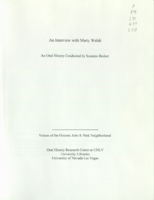Search the Special Collections and Archives Portal
Search Results

Jaime Cruz interview, July 3, 2019: transcript
Date
Archival Collection
Description
Interviewed by Rodrigo Vazquez. Cruz was born in Lima, Peru to Carmen, who retired from CCSD as a teacher's aide, and Jaime, who was a professional soccer player. When young Jaime emigrated to the United States in 1987, it was to join his mother and brother in Las Vegas. The culture shock was significant, but he was undaunted. And, despite his engineering degree, the only employment he could secure was that of dishwasher. Cruz quickly understood the employment barriers that he would encounter and thankfully with the encouragement of mentors he improved his English skills and never omitted his degree from his resume. Eventually, it was noted and the decision to take a position that utilized this training would be one he never regretted. Today Cruz is the Executive Director of Workforce Connections, Southern Nevada's Local Workforce Development Board.
Text

Transcript of interview with Ray Christian by Russell L. Ellis, March 19, 1978
Date
Archival Collection
Description
On March 19, 1978, Russell L. Ellis interviewed former postal worker, Ray Christian (born 1927 in Las Vegas, Nevada). The two discuss Ray’s family history and his experiences as a Black man in early Las Vegas. Ray Christian compares the experiences of his childhood with that of his children in Las Vegas. The interview concludes with Christian expressing how Las Vegas has grown and that there are more opportunities available for his children to pursue.
Text

Sam Diaz interview, January 3, 2020: transcript
Date
Archival Collection
Description
Interviewed by Elsa Lopez. Sam Diaz was born in Los Angeles California, but was raised in Chula Vista, California. He is a police officer with the Las Vegas Metropolitan Police Department and has worked for LVMPD since 2007. He has served in in the U.S. Air Force Reserves since 2008, and served in the U.S. Air Force from 2001 to 2007. Diaz describes his multi-cultural upbringing and growing up in such close proximity to the U.S.-Mexico border. He describes his passion for serving which he had since a young age. He describes his incorporation within every community he has been a part of and talks about the ways he has worked to serve the Las Vegas community since moving here in 2007. He recounts the tragic night of 1 October, the mass shooting that occurred during the Route 91 Harvest music festival on October 1st, 2017 on the Las Vegas Strip. He talks about the various changes that happened within LVMPD since 1 October, and changes that he has seen in the Latinx community throughout the Las Vegas Valley. Diaz also describes the process of adopting two children and raising a multi-racial family with his wife in Las Vegas.
Text

Transcript of interview with Yvonne and Joni Fried by Barbara Tabach, February 17, 2016
Date
Archival Collection
Description
Yvonne Fried, M.D., and Joan “Joni” Fried are the daughters of Milton and Esther Fried, the founders of Freed’s Bakery—the standard to which all other Las Vegas bakeries are held. When the Fried family moved to Las Vegas in 1955, Joni was born here, the fifth child, of the entrepreneurial Milton, a musician by night, and his industrious wife Esther, who guided the family business. As Esther’s 2006 obituary reads: in 1959 the couple opened “a snack bar, selling donuts and Danish, at the Panorama Market on West Charleston, while Milt played in the show band at the Sahara Hotel in the evenings.” For Yvonne and Joni, this made for a rather busy and interesting household to grow up in. Their Jewish upbringing was at Temple Beth Sholom. Photo above honors the multi-generations of the Freed’s Bakery tradition: (L-R) Joni Fried, Anthony & Sarah Fusco (Joni’s daughter) Max Jacobson Fried (Yvonne’s son) holding his son Lucas, and (far right) is his wife Emilia.
Text

Transcript of interview with Valerie Wiener by Barbara Tabach, January 20, 2015
Date
Archival Collection
Description
Valerie Wiener is an accomplished state senator, business owner, president and founding member of the Public Service Institute of Nevada and the Valerie Wiener Foundation. She was born October 30, 1948 in Las Vegas, Nevada. Her service as senator for 16 years and her role as a public servant led her to become the first woman assistant majority leader of the state senate in Nevada. She graduated with a bachelor degree of Journalism at the University of Missouri/Columbia within the School of Journalism earning a Masters of Arts in Broadcast Journalism and a Master of Arts in Literature at the University of Illinois in Springfield while attending law school at McGeorge School of Law in Sacramento in the 1970s. Her generosity is also seen through scholarships and activities at the Louis Wiener Jr. Elementary School. In addition, Valerie is a professional speaker, consultant, and internationally published author. She is the recipients of many awards, such as: ?Women of Achievement Award? in Media; ?Healthy Schools Heroes?; ?Public Affairs Champion Award?; ?Legislator of the Year?, and the Nevada Secretary of State?s recipient of the ?Jean Ford Participatory Democracy Award.? She stays active through her commitment to the Nevada Senior Olympics for both Fitness and Weightlifting earning 17 gold medals from 1998 to 2007. In this interview, Wiener discusses her childhood and being raised in Las Vegas in the 1950s as well as the academic path that led her career into politics. She shares memorable insight into the life of her father, Louis Isaac Wiener, Jr., an accomplished attorney and business man who represented the infamous Benjamin ?Bugsy? Siegel during the construction and opening of the Flamingo Hotel and Casino in 1946. Throughout Wiener?s interview, she highlights the traditions of the small, but growing Las Vegas Jewish population in the 1960s. Among the people she recalls most vividly is her grandmother Kitty Wiener. Wiener also discusses her community service work and her life mantra of giving.
Text

Transcript of interview with Arlene Blut by Barbara Tabach, May 28, 2015
Date
Archival Collection
Description
In this interview, Arlene discusses her family and important friendships; her relations with and impressions of the disparate Las Vegas Jewish communities; the meaningful ways her Jewish relationships in Duluth, Winnipeg, and Las Vegas intertwine; her theatrical, professional, and philanthropic work; the reasons she and Jerry became active Zionists; and their support for Israeli causes. Her liberal sprinkling of Yiddish terms enriches her speech as it exemplifies her deep cultural attachment to and identification with her Jewish heritage, despite the fact that her wide and diverse circle of friends remains predominantly non-Jewish.
Actor, director, friend, mother, producer, wife, and volunteer extraordinaire Arlene Piekoff (now Blut) arrived in Las Vegas in 1971 with two young children and husband, Michael Peikoff, who was opening a surgical practice. Arlene was born and raised in Duluth, Minnesota, where she attended a Conservative Jewish temple but had mostly non-Jewish friends. She met Michael at the University of Minnesota, and they married before he began medical school in Winnipeg, Manitoba, Canada. Arlene and Michael followed his residencies and fellowships to California, Michigan, and Manitoba before they came to Las Vegas Through her brother in law and Ayn Rand?s intellectual heir, Leonard Peikoff, Arlene was exposed to Ayn Rand Objectivism, a philosophy that still influences her political outlook. After her 1975 divorce she began working at the Jockey Club; founded the Meadows Playhouse, Las Vegas?s first professional black box theater; and started Renta Yenta, the valley?s first full-service event planning business. In 1980 she married tax attorney Jerry Blut in a Renta-Yenta-produced, Fiddler-on-the-Roof-themed wedding at Paul Anka's Jubilation Restaurant.
Text

Transcript of interview with Janet Garry by Elyse Rozinsky, February 24, 1979
Date
Archival Collection
Description
On February 24, 1979, collector Elyse Rozinsky interviewed file clerk, Janet Garry, (born on November 24th, 1927, in Louisiana) at her home in Bonanza Village Trailer Park in Las Vegas, Nevada. This interview covers the growth of Las Vegas from 1952 to 1979. Janet recalls the early years of the television and the telephone. She also discusses her own personal experience of raising a family in Las Vegas.
Text

Transcript of interview with Tony Grasso by Coleen Seifert, February 29 & March 1, 1980
Date
Archival Collection
Description
On February 29, 1980, Coleen Seifert interviewed Tony Grasso (born 1926 in Brooklyn, New York) about his career in gaming. Grasso first provides details on his background and how he ended up moving to Las Vegas in 1951 before talking about his experience as a dealer in some of the early casinos. He also talks a little about the different roles and games that casino workers deal and how players are invited to visit casinos. The interview concludes with a discussion on gaming unions and Grasso’s future plans. On a date that soon followed the above date, Seifert also interviewed Doug Charles (born 1954 in Brooklyn, New York) about his career in the gaming industry. Charles also talks about his family background, his arrival to Las Vegas in 1957, and the early development of the various gaming properties in Las Vegas. He later goes into detail over some of his experiences as a dealer, his opinions on mob control over gaming, and some of the political and legal issues that have arisen in La
Text

Transcript of interview with Emma Ellsworth by Clark Ellsworth, March 5, 1980
Date
Archival Collection
Description
On March 5, 1980, Clark Ellsworth interviewed his grandmother, Emma Ellsworth (born 1902 in Payson, Utah) about her experiences in Southern Nevada. Ellsworth first talks about growing up in Utah and getting married before moving to Pioche, Nevada during the Great Depression. She also talks about bringing up a family in Las Vegas as well as her and her husband’s work in running Beneficial Life, a life insurance business, in Las Vegas. Ellsworth also talks about the Mormon churches in Las Vegas, the schools her children attended, and the number of grandchildren and great-grandchildren she had at the time.
Text

Transcript of interview with Marty Walsh by Suzanne Becker, July 19, 2007
Date
Archival Collection
Description
In 2002, Marty Walsh and her husband purchased a home in the John S. Park Neighborhood. Three aspects attracted them to their 1941-built home: the quality construction; the aesthetics and details of the house; and the "old-fashion human element" that she associated with her grandparents. Marty describes their relocation to Las Vegas after living for nine years in Ireland and her joy of discovering the John S. Park community. For her there is a neighborliness that they found in the form of the Neighborhood Watch. She feels the neighborhood still has work to do, but the gentrification has had splendid results as new "urbanites" replace original homeowners. From her artist point of view, she also provides thoughts about the impact the artist community of musicians, painters, and creative artists has had on the neighborhood. Even though she is relatively new to Las Vegas, she is well researched in the historic aspects of John S. Park location: once a fertile plot of land where
Text
